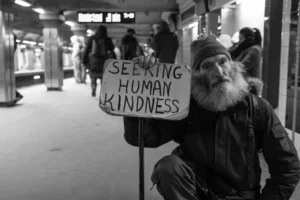“Mommy, I really like this story! The girl in it is so cool! She doesn’t have to sit and wait for a boy to save her like in the other books, and she gets her own adventure!”
My mom loves retelling this anecdote of when I first described my favorite childhood picture book. I was only five and could barely read, much less absorb academic rhetoric on gender discrimination. Yet I knew there was something intrinsically wrong when I read the other stories that didn’t reflect who I was or what I liked.
I felt this again when I wondered why girl scouts were learning to bake, sew and sell cookies while the boy scouts got to do the cool stuff like camping, making fires and learning to tie intricate knots. The “girl scout” story didn’t feel like me.
At home, I hated dolls because they didn’t get awesome tanks like my brothers’ army rangers did. My reluctance to identify with them was quickly rectified, however, by Sharpied dark blue hair and a safety-pinned nose ring. If I had to have a doll, this girl was going to write her own story.
As a single 26-year-old woman living alone in East Asia, I can’t escape the fact there are a whole lot of boxes that don’t quite fit me. My interests and talents rarely seem to line up with the opportunities offered me.
Nigerian author Chimamanda Ngozi Adichie, in her well-known TED talk “The Danger of a Single Story,” gives a name to these simple, predictable boxes we often assign: single stories. When we retell the single story, Adichie warns, we reduce a large group to an over-simplified, unilateral narrative. But individuals are much more nuanced than we’d care to admit. Single stories lull us into believing we understand large, complex issues or people groups or problems with only a single, flat narrative. The problem with single stories isn’t that these narratives are never true, but they’re rarely always true, leaving the ill-fitting hero or heroine to feel different and misunderstood. Believing we understand is easy — actually understanding is much harder.
Picture books can’t do justice to our complexity as people. Surely you’re not fully defined as the washed-up high school athlete, the overachieving, Type-A female or the quiet, socially awkward friend. But we continue to embrace these single stories and believe they represent the truth, about ourselves and others. You’ve likely seen this at play in your own church, leaving you feeling out of place or misunderstood. We need to expand our narratives; our dialogue must leave room for nuance. Consider the following single stories, among others, that may have taken root in your church:
1. “Only men struggle with lust.”
Maybe you’re the woman who actively fights temptation as she trains beside shirtless men in her runner’s group. Are you the only woman privately waging war against lust? Definitely not. But when you hear this story, you begin to wonder if there’s something fundamentally wrong with you. In surveys among Christians, 60 percent of women claim to have had significant struggles with lust, and 13 percent of young women admit to frequently viewing pornography, so why do we keep relegating lust to the male sphere? Because a single story is easier to understand than the complex, multi-layered narrative that female sexuality demands.
2. “Women are the emotional ones while men should be the strong ones.”
Is this statement a culturally informed generalization or a biblically derived fact? Maybe you’re the young man who feels strongly, often relying on your gut to make decisions, experiencing your emotions more deeply and outwardly than your sister or mother. Does your counter-narrative mean your God-given emotions defy how you should feel? As 34.5 percent of men would identify more as feelers than thinkers according to their MBTI type, you’re probably not the only man in your church, or even your friend group, facing these concerns.
As Val Dunham writes, “If we work to push back on arbitrary gender norms … we affirm the idea that gender isn’t swayed by things like emotional expression and an interest in sports. Biblical teachings make clear that our Creator outlined different functional purposes for men and women, but those purposes are not reliant on our cultural interpretations of femininity and masculinity.”
3. “You’re too desperate for marriage. Learn to be more content in your singleness.”
I’m sure you’ve tried to find it — the switch that’ll magically erase all your desire for marriage and family. If we each had access to this, we could shut off our emotions when they seem to conflict with the reality of our situations. Unfortunately, that switch doesn’t exist, which means “contentment” can’t possibly translate to the absence of longing. When it seems like you long for marriage far more than others (and far more than you’re told you should), don’t pile guilt on top of shame by believing your desires indicate a lack of contentment. Instead, ask the Lord to supply you with a measure of true contentment that allows room for His good plan both now and in the future.
4. “Single people should cultivate biblical virtues in preparation for marriage.”
You’re 36, you’ve been listening to sermons and preparing to be a wife for almost two whole decades, but you’re still single. Is it possible to absorb the idea of if a spouse comes, rather than when? Honestly, lifelong singleness is a real possibility. We should continue to hope for marriage, but as we submit this longing to God, we acknowledge it may never come — let’s bank instead on the promises the Lord does make. Instead of building character only to make us better spouses in the future, let’s cultivate Christlikeness for the sake of Christlikeness.
***
Single stories are often rooted in truth. As Adichie says, “The single story creates stereotypes, and the problem with stereotypes isn’t that they are untrue, but that they are incomplete. They make one story become the only story.” So even while we understand how these generalizations are created, as a corporate body we do a disservice to our brothers and sisters when we discredit the legitimacy of their unique chapters in the grand narrative of the Christian experience.
Are we then allowed to address these general issues at all? Without a doubt, yes. Equipping believers to combat sin and serve in the local body is important, and that requires painting with a broad brush at times. But perhaps when these kinds of single stories are stated from the pulpit or shared in small groups, we can be aware of two things:
1. These generalizations aren’t reflective of every experience, and accordingly we must show grace to others and ourselves if (and when) we lie outside of the norm.
2. Often stereotypes exist because people have never seen anything to the contrary.
Be willing to patiently engage with others, highlighting the outliers and exceptions, in order to cultivate compassion for those who are often overlooked and marginalized.
While we work to accommodate differences, let’s remember the universal nature of the body of Christ, the knitting together of the hands, feet, arms and legs in unity under the Head. Let’s take hope in the one true single story: the narrative of the God of Heaven who is reconciling a common people to Himself, as we walk purposefully with one another in humility and grace.
Copyright 2016 Juli Cooper. All rights reserved.











